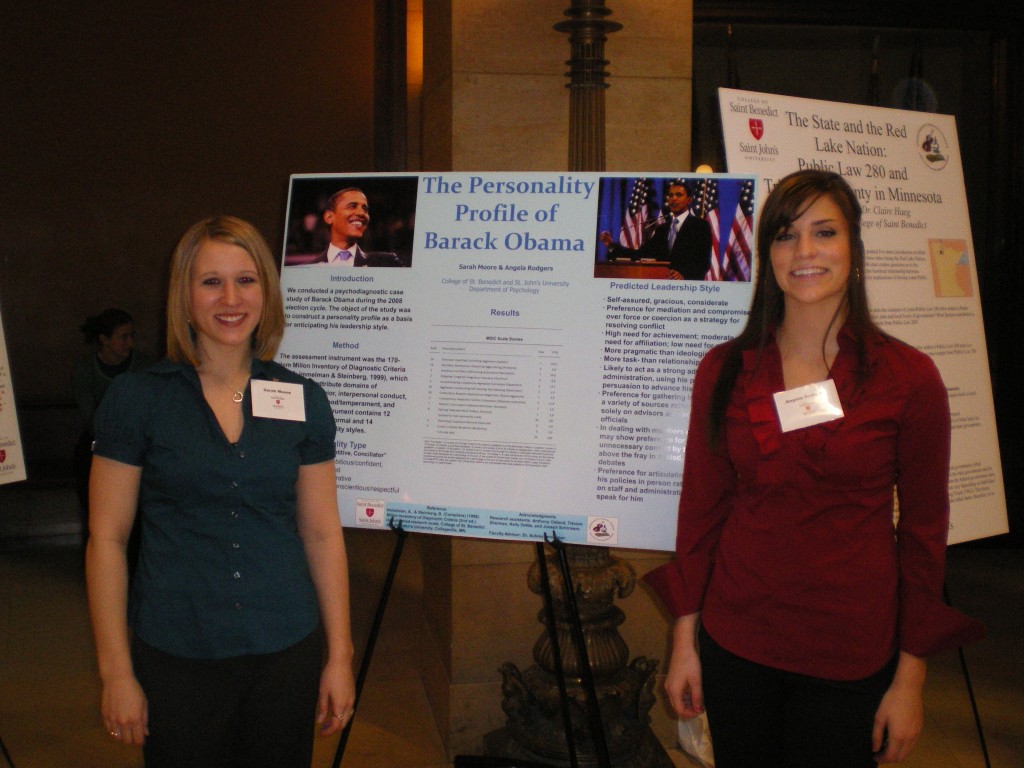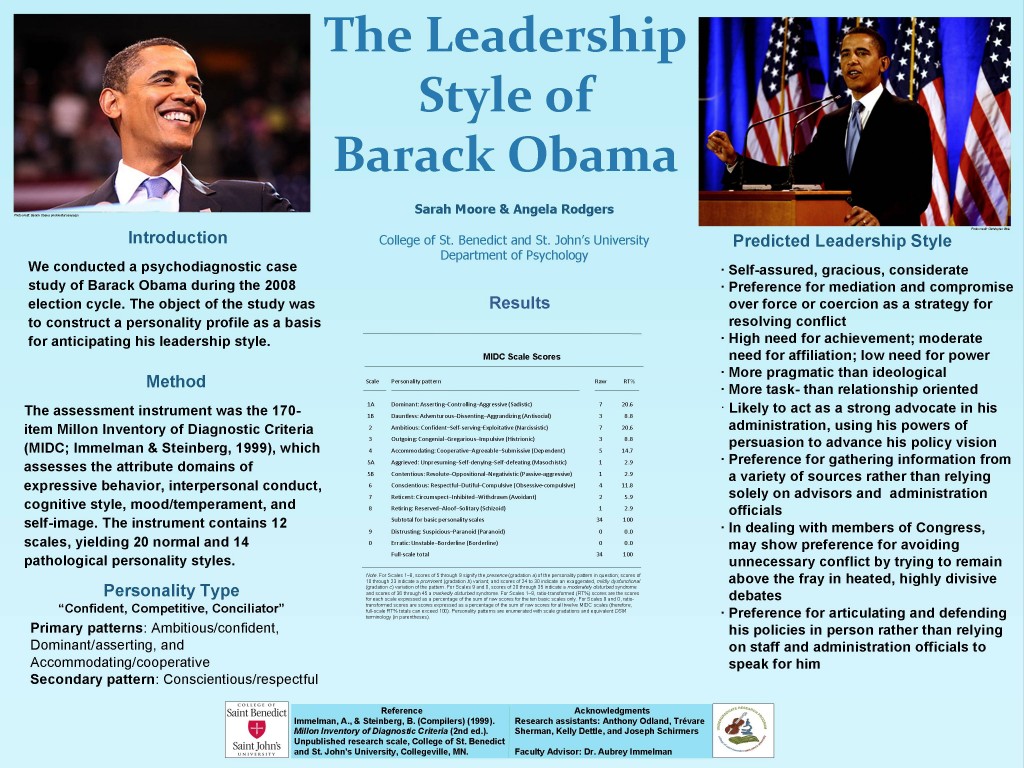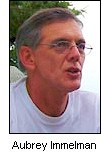Featured Posts

- Index of Psychological Studies of Presidents and Other Leaders Conducted at the Unit for the Study of Personality in Politics
- The Personality Profile of U.S. Supreme Court Associate Justice Brett Kavanaugh
- The Leadership Style of North Korean Leader Kim Jong-un
- North Korea Threat Assessment: The Psychological Profile of Kim Jong-un
- Russia Threat Assessment: Psychological Profile of Vladimir Putin
- The Personality Profile of 2016 Republican Presidential Candidate Donald Trump
- Donald Trump's Narcissism Is Not the Main Issue
- New Website on the Psychology of Politics
- Unit for the Study of Personality in Politics --- 'Media Tipsheet'
categories

- Afghanistan (228)
- Al Gore (2)
- Amy Klobuchar (4)
- Ayman al-Zawahiri (7)
- Barack Obama (60)
- Ben Carson (2)
- Bernie Sanders (7)
- Beto O'Rourke (3)
- Bill Clinton (4)
- Bob Dole (2)
- Campaign log (109)
- Chris Christie (2)
- Chuck Hagel (7)
- Criminal profiles (8)
- Dick Cheney (11)
- Domestic resistance movements (21)
- Donald Trump (31)
- Economy (33)
- Elizabeth Warren (4)
- Environment (24)
- George H. W. Bush (1)
- George W. Bush (21)
- Hillary Clinton (9)
- Immigration (39)
- Iran (43)
- Iraq (258)
- Jeb Bush (3)
- Joe Biden (13)
- John Edwards (2)
- John Kasich (2)
- John Kerry (1)
- John McCain (7)
- Kamala Harris (5)
- Kim Jong-il (3)
- Kim Jong-un (11)
- Law enforcement (25)
- Libya (18)
- Mahmoud Ahmadinejad (6)
- Marco Rubio (2)
- Michael Bloomberg (1)
- Michele Bachmann (173)
- Mike Pence (3)
- Military casualties (234)
- Missing person cases (37)
- Mitt Romney (13)
- Muqtada al-Sadr (10)
- Muslim Brotherhood (6)
- National security (16)
- Nelson Mandela (4)
- News (5)
- North Korea (36)
- Osama bin Laden (19)
- Pakistan (49)
- Personal log (25)
- Pete Buttigieg (4)
- Presidential candidates (19)
- Religious persecution (11)
- Rick Perry (3)
- Rick Santorum (2)
- Robert Mugabe (2)
- Rudy Giuliani (4)
- Russia (7)
- Sarah Palin (7)
- Scott Walker (2)
- Somalia (20)
- Supreme Court (4)
- Syria (5)
- Ted Cruz (4)
- Terrorism (65)
- Tim Pawlenty (8)
- Tom Horner (14)
- Tributes (40)
- Uncategorized (50)
- Vladimir Putin (4)
- Xi Jinping (2)
- Yemen (24)
Links

archives

- November 2021
- January 2021
- November 2020
- October 2020
- September 2020
- August 2020
- July 2020
- April 2020
- March 2020
- February 2020
- January 2020
- December 2019
- October 2019
- July 2019
- May 2019
- April 2019
- March 2019
- February 2019
- January 2019
- December 2018
- September 2018
- August 2018
- July 2018
- June 2018
- April 2018
- March 2018
- February 2018
- January 2018
- August 2017
- July 2017
- June 2017
- May 2017
- April 2017
- February 2017
- January 2017
- December 2016
- November 2016
- October 2016
- September 2016
- August 2016
- July 2016
- June 2016
- May 2016
- April 2016
- March 2016
- February 2016
- January 2016
- December 2015
- November 2015
- October 2015
- September 2015
- August 2015
- July 2015
- June 2015
- May 2015
- April 2015
- March 2015
- February 2015
- January 2015
- December 2014
- November 2014
- October 2014
- September 2014
- August 2014
- July 2014
- June 2014
- May 2014
- April 2014
- March 2014
- February 2014
- January 2014
- December 2013
- November 2013
- October 2013
- September 2013
- August 2013
- July 2013
- June 2013
- May 2013
- April 2013
- March 2013
- February 2013
- January 2013
- December 2012
- November 2012
- October 2012
- September 2012
- August 2012
- July 2012
- June 2012
- May 2012
- April 2012
- March 2012
- February 2012
- January 2012
- December 2011
- November 2011
- October 2011
- September 2011
- August 2011
- July 2011
- June 2011
- May 2011
- April 2011
- March 2011
- February 2011
- January 2011
- December 2010
- November 2010
- October 2010
- September 2010
- August 2010
- July 2010
- June 2010
- May 2010
- April 2010
- March 2010
- February 2010
- January 2010
- December 2009
- November 2009
- October 2009
- September 2009
- August 2009
- July 2009
- June 2009
- May 2009
- April 2009
- March 2009
- February 2009
- January 2009
- December 2008
- November 2008
- October 2008
- September 2008
- August 2008
- July 2008
meta

The Change Agenda At a Crossroads
From health care to wars to public anxiety, Obama’s strength as a leader is tested

President Barack Obama walks down the Colonnade of the White House to deliver remarks on the preparation and response efforts surrounding the H1N1 flu virus on Tuesday, Sept. 1, 2009. (Photo credit: Michael Reynolds / EPA file)
By Scott Wilson
![]()
September 6, 2009
Excerpts
As President Obama’s senior advisers gathered at Blair House at the end of July for a two-day review of their first six months in office, what was meant to be a breath-catching moment of reflection was colored by a sense of unease.
To a sleep-deprived White House staff, the achievements since taking office that chilly morning of Jan. 20 seemed self-evident. The agenda of necessity they had carried out to stabilize the economy was rapidly making room for Obama’s agenda of choice: changing the way Americans receive health care, generate and consume energy, and learn in public school classrooms.
But opinion polls showed support for the president and his policies dipping sharply, and the disheartening numbers had shaken the confidence of some of Obama’s staff. […]
The slide has only quickened. Emerging from an angry August recess, Obama is weakened politically and faces growing concerns, particularly from within his own party, over his strength as a leader. […]
Obama built his successful candidacy and presidency around a leadership style that seeks consensus. But he is entering a period when consensus may not be possible on the issues most important to his administration and party. Whatever approach he takes is likely to upset some of his most ardent supporters, many of whom are unwilling to compromise at a time when Democrats control the White House and Congress. […]
Obama has brought change over his first seven months in office, often through direct government intervention, to areas as different as the conflict in Iraq and the American auto industry.
The economy is improving and bailed-out banks are paying back the money with interest. A smooth Supreme Court selection has brought the first Hispanic justice, Sonia Sotomayor, to the highest bench. America’s standing in the world is improving, according to many polls, after Obama’s widely broadcast address to the Muslim world, prohibition of torture in interrogation and decision to close the military brig at Guantanamo Bay.
But Obama’s spending plans that will require $9 trillion in new borrowing over the next decade have alarmed conservatives in his own party, and he could not head off an investigation by his own Justice Department into the Bush administration’s interrogation policies that he had made clear he did not want. Unemployment is still rising. His decision to expand the war in Afghanistan, deploying thousands of additional U.S. troops, has not come with a clear plan for how to leave.
Even though polls show fallen approval ratings, Obama remains more personally popular than his policies. His senior advisers say his leadership strength derives from the ability to remain calm in the maelstrom of 24-hour news cycles, a mark of his once-long-shot 2008 campaign. The anti-government anger that has risen from a thousand town hall meetings over the recess is now testing Obama’s celebrated communication skills and a political style one confidante described as “unsentimental.” […]
Political Capital
Activist presidents always have spent political capital pursuing their goals, and Obama has proved the same. […]
Before Obama’s inauguration, Rahm Emanuel, the White House chief of staff, set out the administration’s goals for the year.
Major reform targets, particularly in the health care and energy sectors, would not be staged one after the other, as in past administrations, but pursued simultaneously at a time when the private sector had been battered by the financial crisis.
Emanuel’s logic was a warrior’s — that is, the side with the initiative succeeds. Since then, the administration has pushed through a dozen pieces of legislation with little obvious public resistance, including measures to expand health insurance for children, ensure pay equity, regulate tobacco and protect consumers from credit card companies. […]
The breadth of Obama’s reform plans, coming after the expensive and interventionist economic rescue measures, is also riling conservatives […]
Smaller than it was a decade ago, the Republican Party has shed many moderates, leaving few who are willing to work even with a Democratic president who has promised less partisan governing.
“At the root of his difficulties is a misperception on his part of the root cause of the problem,” said Obama critic Sean Wilentz, a Princeton University professor and presidential scholar. “He sees the problem as Washington. Fine. But the basic cause is the evolution of the Republican Party.”
Like Lyndon B. Johnson, Obama is pursuing a broad reform agenda with large Democratic majorities in Congress.
But Wilentz said it is harder for Obama to work across party lines without the collection of moderate Republican senators present in Johnson’s time. […]
“You can have an out-of-touch Republican Party, but in Washington that does great damage to reform efforts,” Wilentz said. “He has done what he can to put the country on a new track, and in doing so he can’t help but disappoint some of his supporters. But it’s not a fan club.”
Extreme Street Theater
At a late August town hall forum in Spring Valley, Calif., Robert Billburg, a 49-year-old Air Force veteran and Red Cross worker, watched a scene familiar to YouTube fans this summer.
Police conducted body searches at the gymnasium door. Signs depicted Obama as the Joker; others called him a Nazi. […]
“I think the best description of him is a centrist technocrat,” Billburg said of Obama, whom he supported. “So those on the extremes are going to be very disappointed.”
Increasingly, they are.
During the campaign, Obama pledged to run an administration less concerned by partisanship than by ensuring effective government.
But from his first weeks in office, as his administration worked to secure a stimulus bill the president believed was essential to preventing a broader economic collapse, winning Republican support has been hard. Even the pursuit of it is now viewed by his Democratic base as a sign of weakness. […]
Holding Onto ‘No Drama’
Governing requires the ability to appeal to Congress and the electorate simultaneously, and Obama is attempting to do that with the patience and unflappability that were the hallmarks of his “no drama” campaign. […]
Rickey R. Hendon, a Democratic state senator in Illinois who served with Obama in the legislature there, said the president has always been “conciliatory, a consensus seeker” and that “hasn’t changed in Washington, much to his detriment, I believe.” […]
—————————
Related reports
For Obama and Democrats, Colorado becomes less welcoming (Washington Post, Sept. 6, 2009) — Today, the energy that powered Obama to victory has begun to dissipate. Some of his supporters remain on the sidelines; others are, if not disillusioned, questioning what has happened to his presidency. As they look toward 2010, Democrats are nervous. … Full story
Cook Political Report: ‘A dangerous slide’ for Democrats (Politico, Sept. 3, 2009) — “Even if Obama and Democrats are just as popular next November as they were last November, they might stand to lose five to ten seats in the House based on the altered composition of the midterm electorate alone. The latest public opinion diagnostics, however, point to a dangerous slide. As voters’ views of Obama and Democrats’ handling of health care has dimmed, their inclination to elect Democrats to Congress has waned.” … “Right now, we’re looking at a wave cycle, but the question is will it be a small wave or a major wave.” … Full story
Charlie Cook: Dem situation has ‘slipped completely out of control’ (Politico, Aug. 9, 2009) — “Today, The Cook Political Reports Congressional election model, based on individual races, is pointing toward a net Democratic loss of between six and 12 seats, but our sense, factoring in macro-political dynamics is that this is far too low.” … Full story
————————————————
Related reports on this site
Democratic Reality Check in 2010Â (Aug. 22, 2009)
Barack Obama’s Leadership Style (Feb. 21, 2009)

Sarah Moore and Angela Rodgers in the Capitol rotunda.
Barack Obama: A Question of Toughness (Nov. 2, 2008)
Click image for larger view

“The Personality Profile of President Barack Obama: Leadership Implications.” Research poster presented by Sarah Moore, 44th annual Minnesota Undergraduate Psychology Conference, April 18, 2009, College of Saint Benedict, St. Joseph, Minn. (Supervisor: Aubrey Immelman, Ph.D.)
————————————————————————————————————————
FROM THE ARCHIVES: One Year Ago Today — September 6, 2008

Old Creamery Arts & Crafts Show in Rice, Minn.
One year ago today, on the 54th day of my campaign against U.S. Rep. Michele Bachmann for the Republican nomination as House of Representatives candidate in Minnesota’s 6th Congressional District, volunteers handed out campaign literature in downtown Forest Lake (Washington County) and at the Old Creamery Arts & Crafts Show in Rice (Benton County), while I had a meet-and-greet at the Saint John’s University football season opener in Collegeville.
VOTER GUIDE
As noted before, media organizations have begun publishing their voter guides for the 2008 election. Today, I feature information from the WCCO-TV / WCCO-Radio Voters’ Guide.
 Biographical Information
Biographical Information
Address: 99 – 8th St. N.
City/Town: Sartell, MN 56377
Campaign phone: (320) 240-6828
Web site: www.immelman.us
Email: info@immelman.net
Age: 52
Marital status: Married
Family: Four children (13, 11, 9, 2)
Religion: Catholic
Education/Degrees: Ph.D., Nelson Mandela Metropolitan University (with coursework at the University of Wyoming and the University of Maine), 1991
Military experience: Infantry paratrooper and military psychology officer, South African Defense Force (Cold War era counterinsurgency Border War); U.S. military consultant (nuclear counterproliferation, threat assessment, deterrence)
Experience: Volunteered in Patty Wetterling’s congressional campaign (motivated by a shared interest in public safety issues)
Community involvement: Sartell Community Education and Summer Recreation program; Stearns County Skywarn
Endorsements: None sought
Platform: U.S. national security
Economy
I’m a traditional fiscal conservative who believes in low, equitable, and fair taxation to fund essential government functions; fiscal restraint; and a balanced budget. We have no business spending hundreds of billions of taxpayer dollars toppling foreign dictators that pose no national security threat to the United States and then rebuilding their countries on the back of the U.S. taxpayer while our own vital needs remain unmet.
Iraq and the War on Terrorism
My signature issue is U.S. national security. My main concern (and chief reason for running) is the unintended consequences of the ill-conceived Iraq war. More than just exacting a huge cost in American blood, treasure, and loss of international stature, the invasion of Iraq has complicated the national security environment in the Middle East for the United States.
We should reduce our military footprint in Iraq in a manner that does not jeopardize recent security gains or enable Iran to exploit the disrupted balance of power created by the removal of its mortal enemy, Saddam Hussein. We need to shift more of our military assets and resources to counterinsurgency operations in Afghanistan and the Pakistani border region to fight the Taliban and al-Qaida. In addition, there needs to be greater recognition that terrorism cannot be defeated by military means alone. We must invest in force multipliers that enhance our prospects for victory in the war on terror.
How would you transform the U.S. energy policy?
I do not believe a freshman member of Congress has the capacity to transform U.S. energy policy. However, within the parameters of the energy policy formulated by the next president, I will support all reasonable means to increase supply, reduce demand, and develop energy alternatives that reduce our reliance on Middle Eastern oil.
Also, we should be mindful of the fact that the cost of energy to the U.S. consumer is influenced by our foreign, monetary, and fiscal policies. We should not be printing and borrowing money to fund unnecessary wars. Monetary and fiscal policies that increase the money supply and rely on deficit spending to pay for Iraq contribute to inflation and drive down the value of the dollar, which adds to the high price at the pump and the grocery checkout counter.
———————————
RELATED STORY
Michele Bachmann Blows Off St. Cloud Times Questionnaire
Her primary opponent, Immelman, filled out and returned the questionaire. Larry Schumacher at the St. Cloud Times has the story. …
Immelmann sounds like a true conservative…. his comments on fiscal policy make sense to me.
— Lady …
Oh, and I forgot to add, people in the northwest part of the district actually read the newspaper…. Bachmann’s campaign would have gotten some free press and a good compare/contrast layout if they had bothered to respond. The lack of response amazes me.
— Lady …
Expand domestic drilling and taking an aggressive approach to stop illegal immigration, I like that! Why won’t liberals take a common sense approach like this?
— dare2sayit.com …
He sounds like a more genuine small-government Republican than the incumbent. Congress, both under Republican and Democratic leadership, has never been honest about including the cost of the Iraq war in the budget. Hell, the last Republican led Congress under Dennis Hastert/Tom DeLay didn’t even do serious work on budget bills…. we ran on ‘continuing resolutions’. They were too busy with Terry Schiavo’s feeding tube and flag burning legislation.
— Anonymous …
Leave a Reply
You must be logged in to post a comment.


September 7th, 2009 at 3:09 am
[…] Read the original post: Immelman for Congress » Blog Archive » Obama Agenda At Crossroads […]
September 7th, 2009 at 10:35 am
[…] This post was Twitted by A_Immelman […]
September 6th, 2010 at 9:14 am
[…] Obama Agenda At Crossroads […]
December 7th, 2010 at 12:11 am
[…] Obama Agenda At Crossroads (Sept. 6, 2009) […]
September 8th, 2011 at 11:32 am
[…] Obama Agenda At Crossroads […]